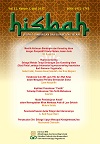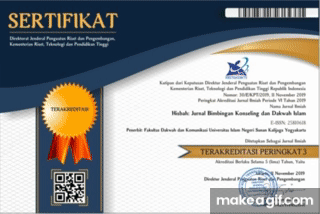KARAKTERISTIK KEPRIBADIAN KONSELOR DALAM TOKOH PEWAYANGAN PUNTADEWA
DOI:
https://doi.org/10.14421/hisbah.2022.191-05Abstract
Counseling is the process of supporting a counselor (client) counselor with the goal of resolving the problems the counselor is experiencing. To support successful counseling, counselors need to pay attention to their personality competencies. These personality competencies are considered important to support the counseling process. However, the commonly used personality traits of advisors are the personality traits of effective advisors who come from abroad and have a different cultural sensibilities than Indonesia. The main purpose of this study is to identify and explain the character of Puntadewa, and the results of identifying and explaining the character of Puntadewa can be used as a reference for Indonesian consultants to develop effective consultant characteristics. To be able to use it. About local culture. The research method used by researchers is qualitative. The type of study used is library study. The results of this study show that there are six personality traits that can be derived from the Puntadewa doll character that can be used as a reference for Indonesian counselors based on local wisdom. (2) Courtesy; (3) Fairness; (4) Wise; (5) Honesty. (6) Simple; (7) patient.
Keywords: Characteristics, Counselor, Puntadewa.
References
Ahmed, S. W. (2011). What Does It Mean to Be a Culturally-Competent Counselor? . Jornal For Social Action in Counseling and Psychology, 17-28.
Anggoro, B. (2018). Wayang dan Seni Pertunjukan: Kajian Sejarah Perkembangan seni wayang di Tanah Jawa sebagai Seni Pertunjukan dan Dakwah. Jurnal Sejarah Peradaban Islam, 122-133.
DYP, S. (2007). Buku Ajar Psikologi Konseling. Semarang: Jurusan Bimbingan dan Konseling FIP UNNES.
Feist, J. F. (2009). Teori kepribadian. Jakarta: Salemba Humanika.
Galang Surya Gumilang, A. (2017). Kepribadian Semar Sebagai Citra Diri Konselor. Proceeding Seminar Dan Lokakarya Nasional, 49-57.
George, M. (2008). The Element Of Lybrary Research. United Kingdom: Princeton University.
Godwin, G. (2003). Social Support Provision And Cultural values In Indonesia And Britain. Jurnal of Cross-Cultural Psychology, 1-6.
Gumilang, G. S. (2018). Meaning of Punakawan Symbolic Guidance and Counseling. TERAPUTIK Jurnal Bimbingan dan Konseling, 32-38.
Gustad, J. W. (1953). The Definition of Counseling. In R. F. Berdie(ed), Roles and Relationship in Counseling. Minneapolis: University of Minneapolis Press.
Hadi, S. (1990). Metodologi Research Jilid I. Yogyakarta: Andi Offset.
Hartono. (2015). Psikologi Konseling. Jakarta: Kencana.
Ishak, M. d. (2012). Counseling Professional Ethics From viewpoint Counselor Educator. Journal of Educational Psychology & Counseling, 71-80.
Kontributor Palembang, A. Y. (2020, September 01). Guru BK Cabuli Siswi SMP di Sekolah, Polisi: Pengakuannya Khilaf. Retrieved from KOMPAS.com: http://regional.kompas.com/read/2020/09/01/12533631/guru-bk-cabuli-siswi-smp-di-sekolah-polisi-pengakuannya-khilaf
Kresna, A. (2012). Mengenal Wayang. Yogyakarta: Laksana.
LPMQ. (n.d.). QUR'AN KEMENAG. Retrieved from Qur'an Kemenag: https://quran.kemenag.go.id/
Mappiare, A. (2011). Pengantar konseling dan Psikoterapi. Jakarta: PT RajaGrafindo Persada.
Mustari, M. (2014). Nilai Karakter Refleksi Untuk Pendidikan. Jakarta: PT RajaGrafindo Persada.
Nursyamsi. (2017). Kepribadian Konselor Efektif. Jurnal Al-Taujih: Bingkai Bimbingan dan Konseling, 1-7.
Omdsmy_. (2018, Februari 16). Guru Bimbingan Konseling Ini Pukul Murid SMA 11 Kupang Hingga Berdarah. Retrieved from POS-KUPANG.com: https://kupang.tribunnews.com/2018/02/16/sadis-murid-sma-di-kupang-ditempeleng-guru-hingga-telinga-bernanah
Prayitno, E. A. (2009). Dasar-Dasar Bimbingan dan Konseling. Jakarta: Rineka Cipta.
Ririne, A. (2018). "Konseling Publik Ritual Musikal Totobuang Pada Komunitas Haur di dusun Kusu-kusu Sereh, Ambon". Tesis. Salatiga: Universitas kristen Satya Wacana Salatiga.
Ristiyani. (2016). Tindak Tutur Santun Sebagai Stategi Pemilihan Bahasa Untuk Komunikasi Konselor Yang Efektif. Jurnal Konseling GUSJIGANG, 43-50.
S, A. G. (2010). Perilaku Prososial Ditinjau Dari Empati dan Kematangan Emosi. Jurnal Psikologi, 33-42.
Sanyata, S. (2006). Perspektif Nilai Dalam Konseling: Membangun Interaksi Efektif antara Konselor - Klien. Jurnal Paradigma, 1-14.
Saputra, W. N. (2016). Identifikasi Karakteristik Konselor Efektif Berdasarkan Tokoh Punakawan Bagong. Jurnal Konseling dan Pendidikan, 58-65.
Sekar_admin_area. (2014, januari 20). Puntadewa. Retrieved from Sekar Budaya Nusantara: https://sekarbudayanusantara.co.id/puntadewa/
Setyaputi, N. Y. (2017). Karakter Ideal Konselor Multibudaya Berdasarkan Nilai Luhur Semar. Jurnal Kajian Bimbingan dan Konseling, 58-65.
Supariyati. (2013, Juli 13). Yudistira/Puntadewa. Retrieved from Wayang Versi Indonesia Mengenal Tokoh dan Cerita Wayang: https://ror2danwayang.wordpress.com/2013/07/13/yudistira-puntadewa/#more-48
Wayang. (2010, Juli 20). Pandawa (1) Puntadewa / Samiaji / Yudhistira / Dharmaputra. Retrieved from Wayang Indonesia: https://wayang.wordpress.com/2010/07/20/pandawa-1-puntadewa-samiaji-yudhistira/
Wayang, O. S. (2020, Desember 13). Watak Akhlakul Karimah. Retrieved from Media Indonesia: https://m.mediaindonesia.com/weekend/368394/watak-akhlakul-karimah
Wijaya, R. F. (2014). Menjadi kaya & terencana dengan reksa dana. Jakarta: Elex Media Komputindo.
Yusuf, U. (2010). Sabar (Konsep, Proposisi, dan Hasil Penelitian). Bandung: Fakultas Psikologi Unis ba.

Downloads
Published
Issue
Section
License
Authors who publish with this journal agree to the following terms:
- Authors retain copyright and grant the journal right of first publication with the work simultaneously licensed under a Creative Commons Attribution License that allows others to share the work with an acknowledgement of the work's authorship and initial publication in this journal.
- Authors are able to enter into separate, additional contractual arrangements for the non-exclusive distribution of the journal's published version of the work (e.g., post it to an institutional repository or publish it in a book), with an acknowledgement of its initial publication in this journal.
- Authors are permitted and encouraged to post their work online (e.g., in institutional repositories or on their website) prior to and during the submission process, as it can lead to productive exchanges, as well as earlier and greater citation of published work.











